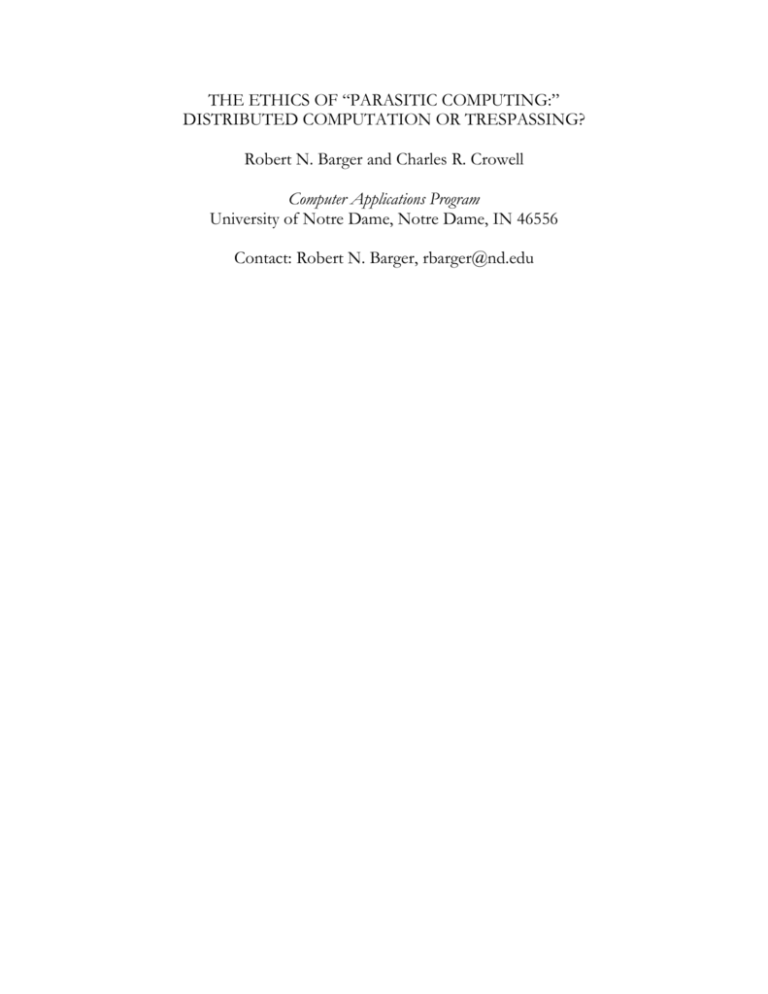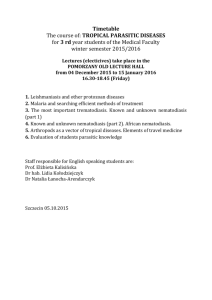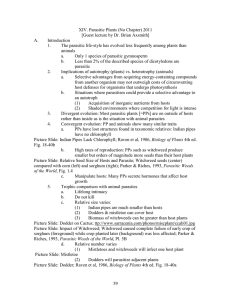the ethics of “parasitic computing”
advertisement

THE ETHICS OF “PARASITIC COMPUTING:” DISTRIBUTED COMPUTATION OR TRESPASSING? Robert N. Barger and Charles R. Crowell Computer Applications Program University of Notre Dame, Notre Dame, IN 46556 Contact: Robert N. Barger, rbarger@nd.edu THE ETHICS OF “PARASITIC COMPUTING:” DISTRIBUTED COMPUTATION OR TRESPASSING? This chapter proposal is presented in outline form with elaboration for some sections. 1. Purpose: The proposed chapter will examine some of the issues raised by an experiment in "parasitic computing" recently reported in the journal Nature. [1] While this parasitic computing experiment represents a form of distributed computing, it differs from other prominent examples such as the SETI@home project in that “host” computers were induced to perform by the “parasite” without the awareness or consent of their owners. This chapter will consider the ethical dimensions of this experiment, particularly the exploitation of Internet protocols, and the dilemmas raised by it. Finally, it will examine alternative Idealistic and Pragmatic ethical viewpoints on this form of distributed computing. 2. Significance: Most dilemmas considered under the rubric of Information Ethics are basically digital versions of older ethical dilemmas (e.g., identity theft, copyright infringement, invasion of privacy). This parasitic computing experiment is unique, however, in that it presents a truly original ethical dilemma in the field of computing, namely, the exploitation of standard Internet protocols to enable the cooption of processing resources without the knowledge or permission of those who own the host servers. A number of interesting questions are raised by these unique circumstances. Among these are: 2.A. To what extent does the owner of a web server consent, explicitly or implicitly, to IP interrogation when that host is connected to the Internet? 2.B. What constitutes abusive activation of IP protocol decoders, or any other physical sensors (e.g., motion sensors, electric eyes, etc.) located in the public domain? 2C. Is parasitic computing really a form of trespassing or is it more like using a bathroom in a MacDonalds without making any purchase? 3. In the completed chapter, this section will present a description of the parasitic computing experiment based on the published article in Nature. [1] Details will be provided about how IP protocols were exploited for purposes of distributed computation. 4. This section of the completed chapter will consider the issues raised by the parasitic computing experiment and will provide some preliminary answers to questions 2.A., 2.B., & 2.C. above. 5. Conclusions: How is one to judge the ethics of parasitic computing from a philosophic perspective? This section will present the relevant alternative viewpoints and will suggest, given the contrasting views, that there may be no clear-cut answer. The Idealist philosopher Immanual Kant used what he called the Categorical Imperative to assess the ethics of any action. One form of his Categorical Imperative states: "Act only on that maxim by which you can at the same time will that it should become a universal law." [2] In other words, if the action you are contemplating is to be moral you must be willing to agree that it would also be right for anyone else to do the same thing. It seems, from the Idealist perspective, that this would require that Internet protocols be used according to their intended purposes so that the trust for which they were instituted would be assured. Another formulation of the Categorical Imperative is: "Act in such a way that you always treat humanity, whether in your own person or in the person of any other, never simply as a means, but always at the same time as an end." [2] Responding to this perspective in a conversation with a Computer Ethics class about the experiment, Vincent Freeh, one of the experiment designers, said that exploiting a protocol is not the same thing as exploiting a person. [3] But while such exploitation is not necessarily the same thing, it also is not necessarily essentially different. Exploiting a protocol might indeed involve exploiting a person, especially when negative consequences result from parasitic computing. In contrast to a Kantian Idealist perspective, the experiment designers seem to take a Pragmatist approach to the ethics of their experiment. One of them, Jay Brockman, is quoted as saying: "The web is a source of information. If someone can contrive a question so as to get an answer other than the one intended, I view that as clever, rather than subversive." [4] This seems to reflect the Pragmatist viewpoint that the end justifies the means. Vincent Freeh, during the above-mentioned class visit, remarked that "intent is critical" (referring to the designers' intent in the experiment). The Pragmatist prefers to look at intent and how it could change the character of an action, whereas the Idealist would concentrate on the intrinsic character of the act, which character the Idealist believes is unaffected by intent. The ethics of parasitic computing would seem, then, to depend upon the philosophic viewpoint from which one approaches the experiment. If one is an Idealist, the experiment would involve ethical problems. But if one is a Pragmatist, no ethical fault is involved. References: [1]. Barabasi, A.-L., Freeh, V. W., Jeong, H. & Brockman, J. B. Parasitic computing. Nature, 412, 894 - 897, (2001). [also available at http://www.nd.edu/~parasite/nature.pdf] [2]. The Internet Encyclopedia of Philosophy. http://www.utm.edu/research/iep/k/kantmeta.htm [3]. Freeh, V. W. Personal communication in visit to Notre Dame CAPP471 Computer Ethics class, February 7, 2002. [4]. Nature, August 30, 2001. http://www.nature.com/nsu/010830/010830-8.html










